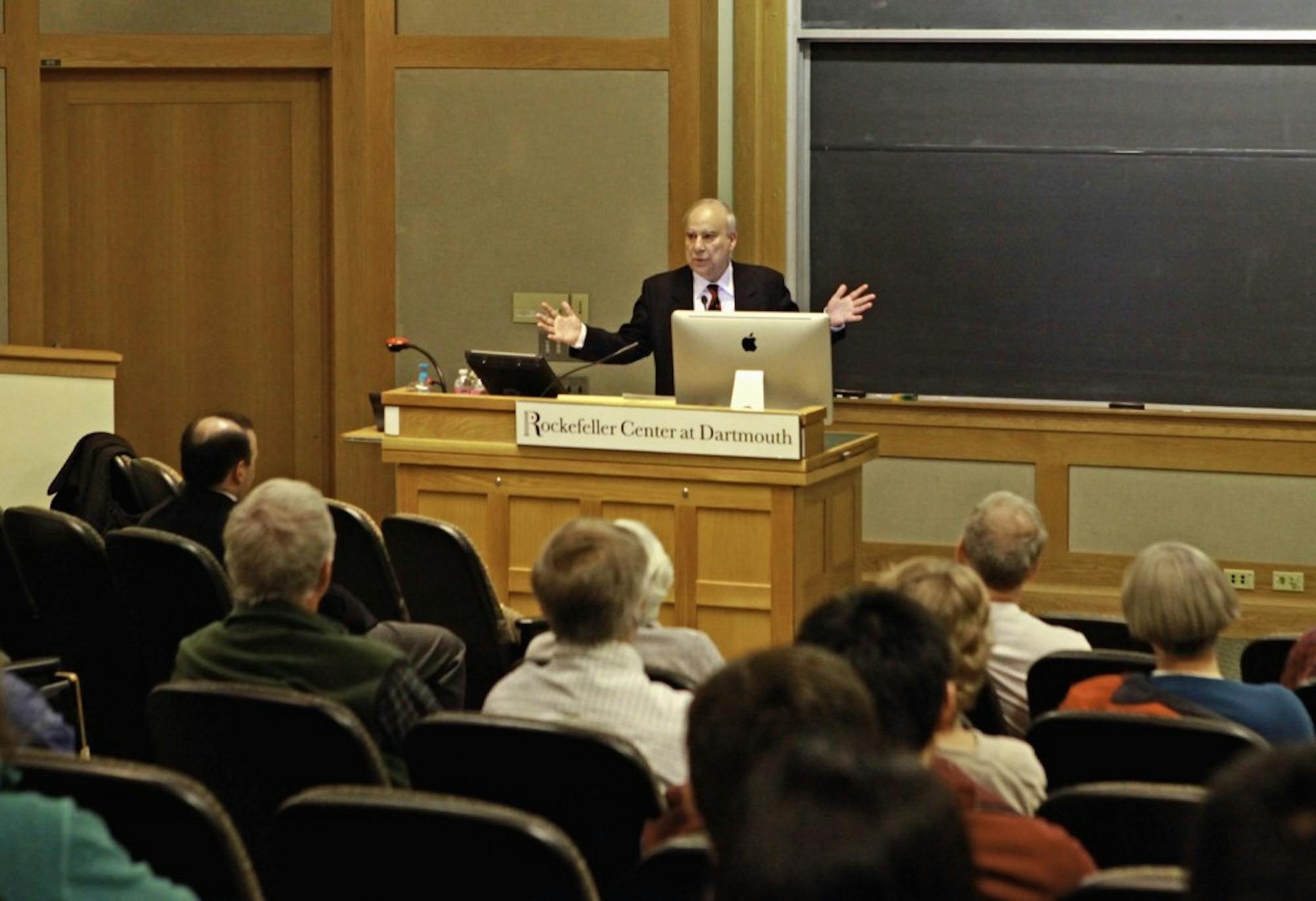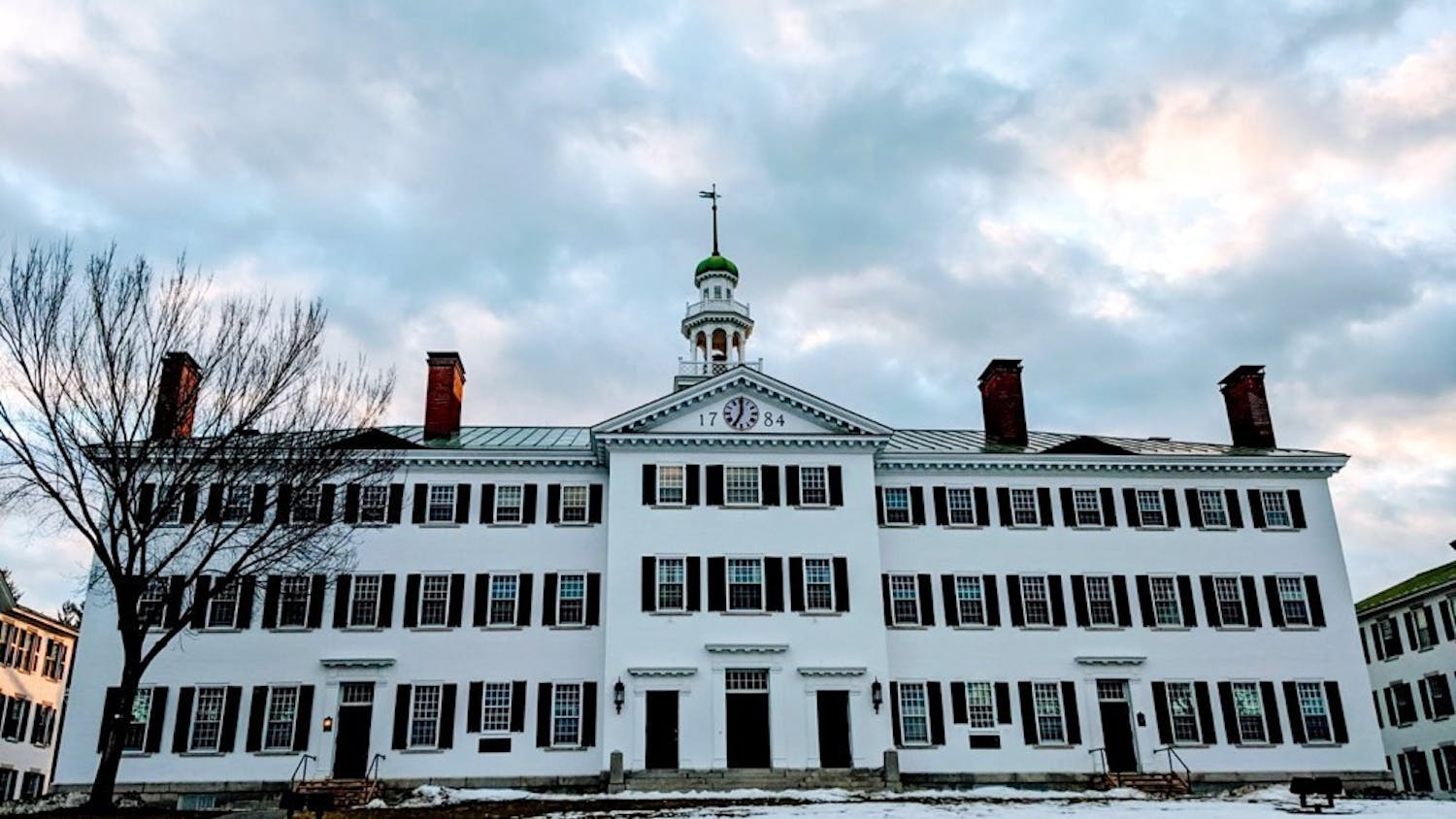Akbar Ahmed, the former Pakistani high commissioner to the United Kingdom and Ireland, said in a lecture yesterday that his mission is “to heal a fractured world.” He said he has set out to undo the narrative of clashing civilizations that has arisen in academic circles and the public sphere since 9/11 to explain the conflicts between East and West and replace it with ideas of dialogue and education.
Ahmed spoke to a crowd of over 100 in Filene Auditorium Monday afternoon in an event hosted by the Rockefeller Center for Public Policy.
“I think there is nothing more important than promoting the idea of the dialogue of civilizations, because the idea of the clash of civilizations has dominated the narrative after 9/11, especially among people who don’t want to think too deeply into what are the issues that are creating so much turmoil,” he said after his lecture.
Ahmed, currently chair of Islamic studies at the School of International Service at American University, has written 27 books, including many on relations between the Middle East and the West.
“These are dangerous times we’re living in and therefore times that we must talk about these issues,” he said at the opening of his lecture.
In the lecture, Ahmed emphasized the role of education in promoting peaceful relations between different groups. Rather than approaching countries individually and providing them with military aid, Ahmed said, Western nations should provide educational aid and facilities to tribes who were invested in educating their youth.
Tribal loyalties play a major role in violence in the Middle East, Ahmed said. He cited the example of the 9/11 attacks, in which 18 of 19 hijackers came from the same tribe. As national governments directly threaten tribes’ sovereignty, these groups engage in extreme, violent actions in an attempt to demonstrate the weakness of national governments, Ahmed said.
A lack of infrastructure and conflicts with centralized governments hamper development of these tribes, he said. The primary conflict in the Middle East is not, in Ahmed’s thesis, between Muslim and Western forces, but between Muslim central governments and Muslim peripheral, tribal areas.
Responding to an audience question about the potential for violence against female students if more funds were invested in education in Muslim areas, citing the abduction of 276 female students by the terrorist group Boko Haram in April 2014, Ahmed said that a lack of education was primarily responsible for the violence itself.
“Those girls were not taken because they were in education,” he said. “They were taken because Boko Haram is not educated.”
In addition to emphasizing the importance of fostering educational opportunities in the Islamic world, Ahmed also discussed the lack of education about other cultures.
“It’s critical that scholars — particularly Muslim scholars — do the rounds, go to campuses and promote the idea of dialogue, of bridge-building and of friendship,” Ahmed said in a subsequent interview with The Dartmouth.
He said that students and young people today should work to have an “understanding [of] the history of each others’ communities and societies, understanding [of] the cultures they’re coming from, so as future leaders they understand that the world is wonderful — it’s rich with different communities, and results are complicated.”
Additionally, Western societies can become more proactive in preventing Muslim youths from joining extremist groups like the Islamic State, also known as ISIS, Ahmed said.
Young Muslims in Western countries have been leaving in the hundreds and thousands to fight for the Islamic State, and many, Ahmed said, may view it as their only real option.
“They have no guidance to move them along a rational path so they are making these choices that are blatantly irrational,” he said. “When people, men especially, commit violence in God’s name, are they really understanding the nature of God and what God is telling them to do?”
Ahmed came to Dartmouth at the encouragement of Louis Goodman ’64, former dean of the School of International Service at American University, where he and Ahmed are both currently professors.
Director of the Rockefeller Center and economics professor Andrew Samwick said that he reviewed Ahmed’s career history decided to invite him to speak after Goodman, who sits at the Rockefeller Center’s Board of Visitors, recommended Ahmed.
“You do even a little bit of reading about him and you realize this is a voice we should have on campus,” Samwick said.
Ahmed said that he had attempted to come to Dartmouth for several years. Over the course of Ahmed’s visit, he will attend three classes, a dinner with students and a lunch with faculty, Samwick said.
Samwick said that Rockefeller’s programs are valuable for both the Dartmouth community and Upper Valley residents.
“We do these public lectures to make sure that everybody on campus and in the community has the opportunity to hear from the speaker,” he said.
Dalton White ’17, who attended the lecture, said that Ahmed’s emphasis on expanding educational opportunities and decentralizing current Middle Eastern states to render more tribal autonomy stuck with him.
Ian Abbott ’17 said that he found Ahmed’s idea of investing in education at the tribal level interesting.
“An anarcho-syndicalist organization around these tribes is probably the most effective stance for implementing his educational plan, because right now with centralization as strong as it is, there is too much room for abuse of power and abuse and misappropriation of funds,” he said.




